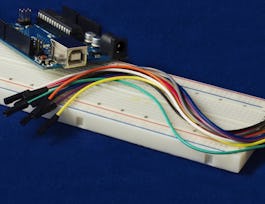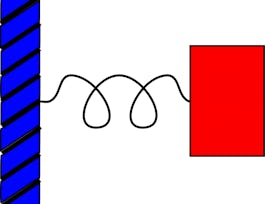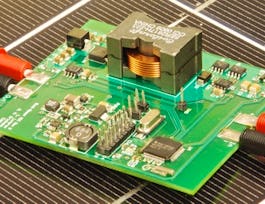Electrical Engineering
Earn Your Degree
Most Popular Courses
Top Rated Courses
Beginner Electrical Engineering Courses
Explore and Create Internet of Things
Programming for Robotics
Design Embedded Systems
Frequently Asked Questions about Electrical Engineering
Electrical engineering is a relatively recent field to emerge from the larger discipline of engineering, but it has become nearly as important to modern life as the structures of the buildings in which we live and work. In the same way that a structural engineer ensures that buildings are constructed in a way that ensures safety, functionality, and durability, electrical engineers design the architecture of electrical systems to ensure they perform properly.
Unlike other forms of structural and civil engineering whose development dates back to ancient times, the history of electrical engineering begins in the 19th century with the work of famous inventors such as Thomas Edison, Nikola Tesla, and George Westinghouse. They pioneered systems that wove together electric generators and transmission lines with the circuits and batteries that powered early appliances like light bulbs, radios, and motors. And, while we have come to depend on electricity to power more numerous and more complex appliances than even these early geniuses of the field could have imagined, the underlying systems are still largely the same.
The principles of electrical engineering may not have changed much over the past century, but the demand for expertise in this field has skyrocketed alongside the exponential growth in electricity use. Today electricity is used to power everything from the microelectronics of your cell phone to the massive server farms responsible for storing all of the data of the internet, and it is even beginning to replace fossil fuel combustion in applications such as hybrid cars, electric cars, and electric heating pumps.
Thus, if you want to help build our electrified, increasingly-digital world, electrical engineering can be a terrific career path that is only becoming more important over time.
Electrical engineering jobs are everywhere. All of the devices and appliances you depend on that use electricity were designed and tested by electrical engineers. Whether in research and development, engineering services, manufacturing, telecommunications, or even the government, employees with electrical engineering skills are critical to creating fit-for-purpose equipment, supervising production, and ensuring they perform properly.
Another popular career in this field is electronics engineering. Electronics engineers are a specialized type of electrical engineer who focuses on the design of circuitry and other components used in computers, telecommunications systems, and other types of digital and consumer electronics. As our world becomes more and more dependent on these devices, and as their size continues to shrink, skills in electronics and microelectronics is also in high demand.
Electricians play a more familiar role in our daily lives - especially if you’re a homeowner - but it’s important to note that becoming a electrical engineer or electronics engineer requires a higher level of education. While these fields are related, electricians are only responsible for installing and connecting electrical systems and fixing any problems that occur in their operation. This is a critically important job, but it is not as demanding as engineers who are responsible for designing the equipment and systems in the first place.
Thus, electrical engineers and electronics engineers require at least a bachelor’s degree, whereas electricians often only have technical degrees. This translates into significantly higher pay, of course. According to the U.S. Bureau of Labor Statistics, the median annual wage electrical engineers is $96,640, and the median annual wage for electronics engineers is $102,700, compared to a median annual wage of $55,190 for electricians.
If you want to pursue a career in electrical engineering, Coursera offers online learning options ranging from individual courses to Specializations to Master of Science degrees. Whether you want to study the basics of power electronics and circuits or dive into more specialized topics like telecommunications and the internet of things (IOT), Coursera lets you learn on a flexible schedule and at a significantly lower cost than on-campus students.
Just because you’re learning online doesn’t mean you have to sacrifice on the quality of your education in electrical engineering, either. All of the courses (and Specializations, MSEs, etc.) offered through Coursera’s platform are taught by faculty at top-ranked institutions around the world. For a much lower price, you can get access to the education on-campus students get at schools like University of Colorado Boulder, Georgia Institute of Technology, the Moscow Institute of Physics and Learning, and many more.
Before starting to learn electrical engineering, you likely need to have a strong desire to learn about electrical systems in consumer electronics, aerospace, manufacturing, or embedded systems. Electrical engineering can be used in transportation networks, lighting systems, HVAC units, power generation, and renewable energy work. Learning the basics of these areas of work will help you to learn electrical engineering concepts.
The kind of people that are best suited for work that involves electrical engineering are analytical self-starters and good problem-solvers who assess challenges and find ways to overcome them using their engineering background. People working in electrical engineering should have good communications skills, orderly thinking processes, and understand the fundamentals of engineering capabilities in manufacturing, science, technology, and other industries.
You might find that learning electrical engineering appeals to you if you are organized, methodical, analytic, and love exploring mechanical processes that are involved in manufacturing and construction. If you get excited about planning for large projects, estimating project timescales and costs, testing, and data analysis, then it’s possible that electrical engineering may be right for you.
When looking to enhance your workforce's skills in electrical engineering, it's crucial to select a course that aligns with their current abilities and learning objectives. Our Skills Dashboard is an invaluable tool for identifying skill gaps and choosing the most appropriate course for effective upskilling. For a comprehensive understanding of how our courses can benefit your employees, explore the enterprise solutions we offer. Discover more about our tailored programs at Coursera for Business here.
Online Electrical Engineering courses offer a convenient and flexible way to enhance your existing knowledge or learn new Electrical Engineering skills. With a wide range of Electrical Engineering classes, you can conveniently learn at your own pace to advance your Electrical Engineering career.
When looking to enhance your workforce's skills in Electrical Engineering, it's crucial to select a course that aligns with their current abilities and learning objectives. Our Skills Dashboard is an invaluable tool for identifying skill gaps and choosing the most appropriate course for effective upskilling. For a comprehensive understanding of how our courses can benefit your employees, explore the enterprise solutions we offer. Discover more about our tailored programs at Coursera for Business here.












































































































